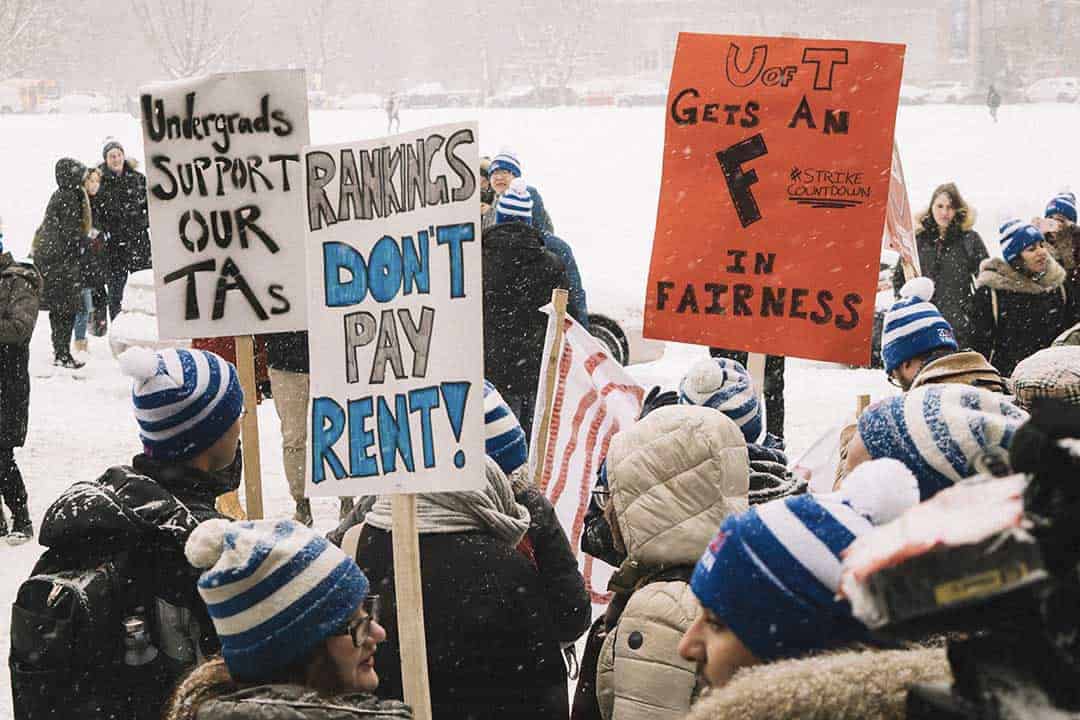The Canadian Union of Public Employees, Local 3902 (CUPE 3902), which represents U of T contract academic workers, is currently in discussions with U of T regarding proposed cuts to health care benefits for Unit 1 members. The reductions, if adopted, would affect undergraduate and graduate teaching assistants (TA), as well as course instructors.
Proposed cuts
Currently, claims on Unit 1’s health plans exceed the university’s available funding. According to a U of T spokesperson, the Unit 1 Collective Agreement requires the university and CUPE 3902 to review benefit levels “with the shared intent of adjusting benefit levels… when there is projected under or overspending in the [benefit] plans.”
While considering alternative plans to alleviate potential overspending, the university committed to three principles: adjusting the benefits currently being used, preserving highly used coverage as much as possible, and limiting the impact of the cuts by spreading the benefit reductions to a wider base.
The university proposed two options for changes to the current health plan. The first option is to introduce a 10 per cent reduction in dental, a 50 per cent reduction in vision, a 10 per cent reduction in mental health services, and a 35 per cent reduction in Health Care Spending Accounts (HCSA) — credits which employees can use to pay for health, dental, and dental care not covered by their plan. In total, the cuts are expected to save U of T an estimated $413,000 while affecting approximately 5,000 claimants.
The second proposed option would reduce dental coverage by 12 per cent, completely eliminate vision, and reduce HCSA by 35 per cent. With this option, the university expects to save approximately $410,000, impacting around 4,500 claimants.
Pushback
PhD candidate Chen Zhong is one of the many TAs whom the proposed cuts would directly impact. In an email to The Varsity, Zhong wrote, “As a [world-renowned] university for its claimed support of diversity and inclusion, the U of T’s senior management should seriously reconsider its proposal to cut down health benefits for us contract academic workers.”
As a racialized international student, Zhong believes that “maintaining health care benefits is essential to protect marginalized and racialized teaching staff from overworking culture.” She added that, “If the cut-down is implemented, we will be indirectly FORCED to work more hours, which will be most likely to distract us from pursuing our research, other academic and life goals.”
Established in 1973, CUPE 3902 was the first legally recognized union of TAs in North America. Over the past 50 years, the union has signed 19 collective agreements with the university and striked on four occasions to achieve contracts.
CUPE 3902 partners with other unions, student coalitions, and U of T employees to oppose increases in tuition, minimize effects of provincial cuts on U of T employees, and promote balanced governance that favours students as well as employees.
CUPE 3902 is organizing against the proposed cuts to health care. In an email to The Varsity, CUPE 3902 President Amy Conwell explained that the reductions in coverage would harm over 9,000 student workers in the union’s Unit 1 division, as well as the Unit 7 division.
Unit 7, previously known as CUPE, Local 3907, represents almost 300 graduate assistants at the Ontario Institute for Studies in Education. Even if a student has held a graduate assistantship in the previous year, they are still considered a CUPE 3902 Unit 7 member. According to CUPE 3902’s website, the Unit 7 Collective Agreement focuses on the “rights and responsibilities of the Union, bargaining-unit members and the Employer.”
“Student-workers are under immense pressure to make ends meet while finishing their degrees. Add the ongoing mental health crisis at the University of Toronto, the pandemic, and now inflation and many student-workers are barely keeping afloat,” Conwell added. “Reductions to benefits levels would mean further financial pressure and unmet medical needs, and so we are looking to find a way forward that maintains current benefit levels.”
Members of the affected divisions, Units 1 and 7, developed a “joint, multi-step plan” to oppose any benefit cuts. “The University can expect an exceptionally organized base of student-workers in the next round of bargaining and strike preparation,” wrote Conwell.


